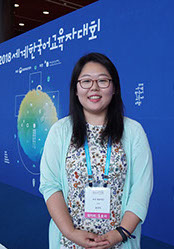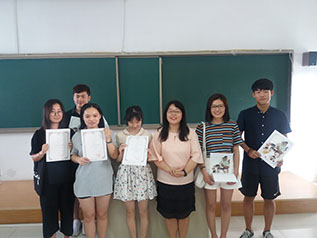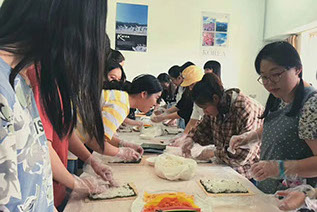
Stories of KSI People
Linyi KSI, China
Yoon Kyung-mi, teacher

 Could you introduce yourself and your institute?
Could you introduce yourself and your institute?
Hello. I’m Yoon Kyung-mi and I’ve been teaching Korean for 10 years. I used to teach Korean in a language institute of a university in Korea and I started working at Linyi KSI since March last year. In 2014 Linyi KSI opened in the southern area of Shandong Province, China. It’s operated by Linyi University and Kangnam University together. Last year, about 360 students attended the institute who are mostly Linyi University students. Some of them, who are the students of Korean Language Department of Linyi University, can go to Kangnam University in Korea via 'Korea-China Joint Program.' I mainly teach Korean to those students who take this course.
 Please share major strength of Linyi KSI.
Please share major strength of Linyi KSI.
Major strength of Linyi KSI is our faculty. Most of our teaching staffs also teach at Linyi University so they have plethora experiences. Furthermore, at our institute we have a total of 96 lesson hours per semester and it’s quite a long period. Thanks to it, we do not have to rush to finish the course. Students learn in depth with <Sejong Korean Language> textbook and they are highly satisfied.
 What are the challenges that Linyi KSI is facing at the moment?
What are the challenges that Linyi KSI is facing at the moment?
At Linyi KSI there are a lot of students who are preparing for TOPIK (Test of Proficiency in Korean). The classes commence in March but students no longer attend them after they finish their TOPIK exam in April. So we are considering a special class for those who are preparing for TOPIK. In addition, it’s really difficult to get necessary materials for Korean cultural events. Linyi is a very small city in China. There aren’t many Korean residents in the area so it’s rather difficult to obtain Korean ingredients and materials. We can’t even think of doing samulnori (Korean traditional percussion quartet). So among the teaching staffs, we’re discussing to bring some of the instruments when we travel to Korea.
 You have worked in Korean language institute of a Korean university for seven years. What is the difference between KSI and the institute of a university?
You have worked in Korean language institute of a Korean university for seven years. What is the difference between KSI and the institute of a university?
At a language institute of universities, we have to teach Korean language to people from various countries. On the other hand, we’re teaching the students who speak the same language so it’s a lot easier. However, it’s important to motivate them to learn Korean. Students who attend language institutes of Korean universities tend to study more diligently than those who study at KSls. Of course, they would study harder as they have come to study in Korea. Meanwhile, KSI learners lack persistence relatively since they learn Korean as a hobby. There are a lot of people who would give up immediately after attending few classes and feel that it’s difficult to learn Korean. Therefore, it’s very important to teach Korean in a fun and easy way at KSI.
 Is there any special characteristic among Chinese learners?
Is there any special characteristic among Chinese learners?
I think the characteristic of Chinese learners is that they cannot accept the difference between Chinese and Korean. Most Chinese students tend to think that Korean is a similar language to Chinese. As they study Korean, they have to learn the differences but they tend to apply Chinese way to Korean language. For example, they would use Chinese intonation to Korean, or they would not pronounce Korean letters which are not in Chinese language. Chinese and Korean grammar is very different so the students would make Korean sentences with incorrect grammar.
 What are you most concerned about these days?
What are you most concerned about these days?
I’m pondering how I can help my students to speak more by using <Sejong Korean> textbook. It covers speaking, reading, listening and writing in an integrated way. It’s not easy to teach all areas of the textbook uniformly for KSIs with limited class hours. Especially, Chinese learners tend to prefer to take notes quietly and just memorize. It’s difficult to make Chinese students to speak. But nowadays, I’m conducting various activities to encourage them to speak more.
 What are special efforts that you are putting in to enhance your classes?
What are special efforts that you are putting in to enhance your classes?
I’m studying Chinese and k-pop for my KSI students. Of course, it’s a lot easier if I explain the difference between Chinese and Korean and they can understand Korean easily. Also, since many of them are so keen in k-pop and Korean dramas, I intentionally spend extra time to watch them. Though I’m studying hard in my own way, I can’t follow the level of my students. At least I’m putting my efforts to show them that I’m aware of which dramas are popular.
 Is there any challenge that you face as a Korean language educator?
Is there any challenge that you face as a Korean language educator?
The most challenging moment for me is when someone says, 'Any Korean person can teach Korean.' It seems that many Koreans still do not regard Korean language education as a professional job. Teaching Korean to foreigners is a completely different matter from just being able to speak Korean as your mother tongue. I hope social perception on Korean language education improves soon.
 What kind of Korean teacher do you wish to become?
What kind of Korean teacher do you wish to become?
I’d like to be a teacher who is like a bus stop for students. When we take a bus, we cannot remember the bus stops that we have passed by on the way as we’re busy thinking about our destination. But in order to reach our destination, we must pass the bus stops. I’d like to be my students’ bus stop. At KSI, Korean teachers and learners have a temporary relationship as people come and go. A student may take my class during this semester, then he or she could take other teacher’s class next semester or drop out later on. However, I sincerely hope to enrich their lives while learning Korean with me even during just one semester. It does not have to be something grand. I just hope that the students would have a good memory about Korea and enjoy learning a new language.
Person
of
September


No.63 | September, 2018
